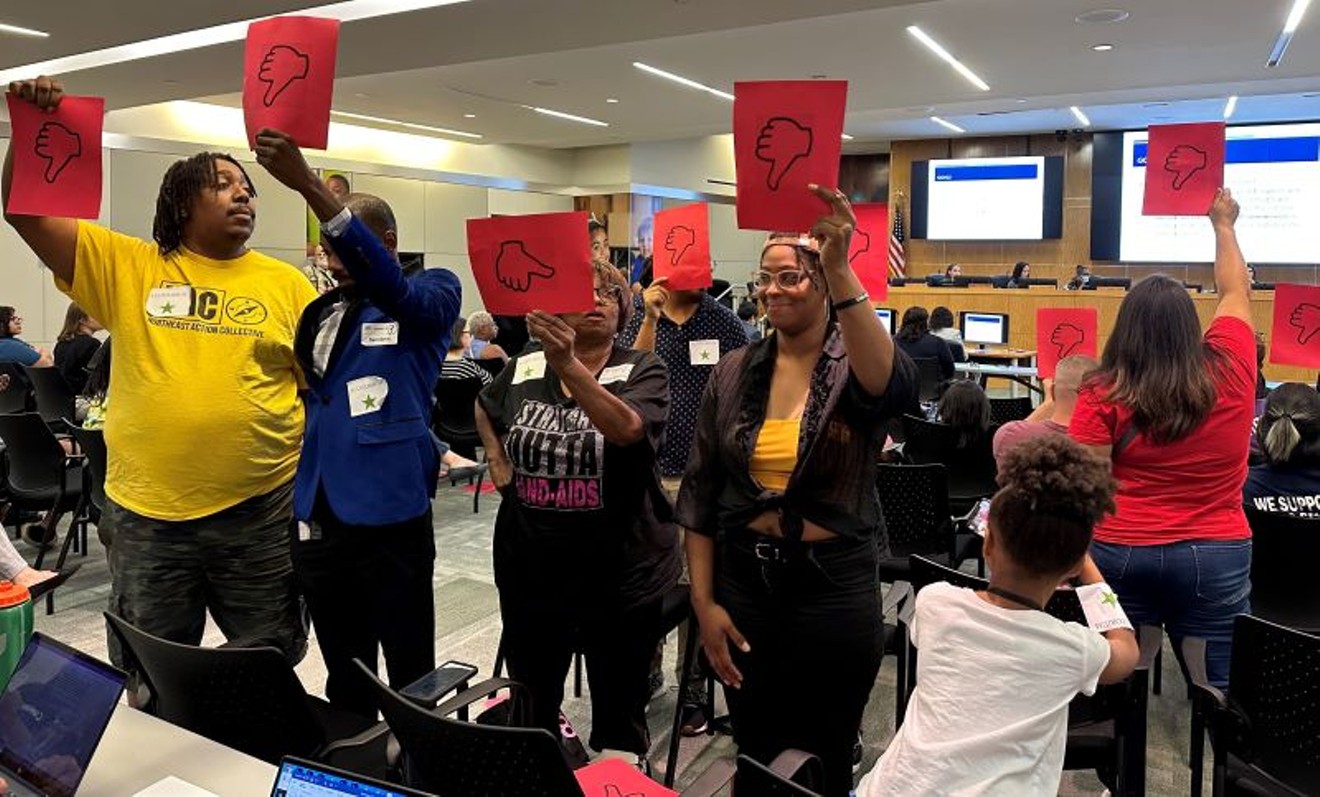Support Us
Houston's independent source of
local news and culture
account
- Welcome,
Insider - Login
- My Account
- My Newsletters
- Contribute
- Contact Us
- Sign out
Superintendent Miles Talks Overhaul to a Less Than Receptive Audience Thursday Night
Margaret Downing June 23, 2023 9:47AM

Some of the audience responded to Mike Miles' not facing the room by turning their backs on him.
Photo by Margaret Downing
[
{
"name": "Related Stories / Support Us Combo",
"component": "11591218",
"insertPoint": "4",
"requiredCountToDisplay": "4"
},{
"name": "Air - Billboard - Inline Content",
"component": "11591214",
"insertPoint": "2/3",
"requiredCountToDisplay": "7"
},{
"name": "R1 - Beta - Mobile Only",
"component": "12287027",
"insertPoint": "8",
"requiredCountToDisplay": "8"
},{
"name": "Air - MediumRectangle - Inline Content - Mobile Display Size 2",
"component": "11591215",
"insertPoint": "12",
"requiredCountToDisplay": "12"
},{
"name": "Air - MediumRectangle - Inline Content - Mobile Display Size 2",
"component": "11591215",
"insertPoint": "4th",
"startingPoint": "16",
"requiredCountToDisplay": "12"
}
]
It doesn’t matter that a school has received an A or B academic rating from the state of Texas if only 15 percent of its kids are reading on grade level, Superintendent Mike Miles told the Houston ISD Board of Managers and the public Thursday night.
"Not all kids are in schools that are doing well," he said as he began his presentation. Using a power point, he went on to say that "our proficiency has not risen over 19 years." Which led him to his main point of the evening: he believes a major system overhaul is urgently needed because what HISD has been doing is not working at too many of its schools.
That was not what the audience assembled in the board room wanted to hear. One of their main arguments has been that with A and B ratings, some of the schools selected for his New Education System turnaround plan — Kashmere, North Forest, Wheatley and their feeder schools — don't belong there particularly at the elementary school levels. To Miles, however, low student scores in high school begin with the elementary and middle schools before them.
And the data that's most important to him is how well students are doing in reading and math.
On a night that the board finally and formally hired Miles as its full time superintendent at $380,000 a year in a contract that runs through August 31, 2026 with an incentive pay plan still to be worked out, the mood was calmer than past meetings. The room was filled with seats and few people were relegated to the overflow room to watch proceedings by screen. No one was thrown out or arrested, as most people most of the time contented themselves with snapping fingers although there were some boos and semi-controlled outbursts, with a couple of warnings from Board President Audrey Momanaee.
Which didn't mean those in attendance were happy about Miles's plans. Melissa Yarbrough, for one called Miles' plan for 29 schools far from new. "It's actually not all new. A lot of it is setting us backwards. Back to ESL instead of dual language, back to electives not being important enough to have certified teachers, basing everything on test scores and assuming it's the teacher's fault when research has shown for years that test scores correlate to students' ... economic status."
All of which was an eerie echo of a HISD school board meeting held 12 years ago when several members of that board told parents that the state recognizing their schools as “recognized” or “exemplary” based on state – not national – student testing was essentially meaningless. School district leaderships have a problem when they crow over their A and B rated schools one day and then turn around and say that's not the only mark of success, or maybe even a good one.
It was February 2011, in a stormy board meeting with upset parents arguing vainly against the district adding their schools to the Apollo 20 turnaround program. They feared the stigma, they didn’t want the changes it would bring, and they didn’t understand how it all could have been happened especially since the state had given them high ratings and told them it was so important that the students do well on the Texas standardized tests.
These parents and community leaders had supported the pizza parties, the pep rallies, the constant testing because there was a real goal to be achieved: top marks with the state when their children aced what was then the TAKS (Texas Assessment of Knowledge and Skills) test — whose scores were a major factor in whether the schools were awarded an excellence rating.
But as Miles did Thursday night and as then board members explained 12 years ago, the data from the NAEP (National Assessment of Educational Progress) known as "the nation's report card" shows Texas students and HISD kids in particular significantly behind the norm, especially at certain schools and especially among Black and Hispanic students. Their positions are similar: The state-anointed labels don't matter; too many of these kids weren’t doing well.
"The TAKS test means less than it ever did," then-trustee Harvin Moore said at the time. "It does represent something. Unfortunately it represents less and less with each passing year. And we're fooling our schools, we're fooling our teachers and we're fooling our public if we continue to focus solely on the TAKS test."
"TAKS is not a competitive test. You've been misled and misdirected if you think being recognized is okay. Recognized is not okay. TAKS has no rigor," former trustee Lawrence Marshall lectured the room. So the board voted to invest huge funds in Apollo 20, the brainchild of then Superintendent Terry Grier. Apollo 20 was not only was not successful but fostered resentment at many of the district's other schools that were not getting those extra funds. Gains after a year were not as expected and those made were not sustained.
Now Miles wants to put his own system starting with these NES schools, a system that also takes money away from elsewhere in the district for its funding. And while he wasn't as harsh as those trustees of 12 years ago, in a briefing after the meeting, he said the A and B ratings were just one marker and shouldn't be the final word on whether students are doing well at a school.
In response to questions from board member Rolando Martinez, Miles maintained that his program will do well as long as it receives financial support — a story that has been told throughout the country with once promising programs fading when their funding dries up.
During the public speaking session, Miles once again remained outside, only entering the room at 6:18 p.m. It appears this will be his standard method of operation going forward, no matter how many speakers talked of his "lack of respect" to the community by doing so. He has explained he wants the public's attention centered on the board.
Miles doubled down on this as he began his presentation about his 2035 student readiness plan for students and turned his back to the room. As his talk went on he occasionally glanced over to the audience behind him, but the overwhelming impression was that he didn’t need to explain himself to the community, just to the appointed board.
In response, some of the audience stood up with their thumbs down red flyers and turned their backs on Miles.
The board passed its 2023-24 budget unanimously and after a lengthy closed session, came out to a room empty of everyone but media reporters, photographers and camera operators, to announce, among other things that they were hiring Miles as superintendent. In fact every vote that night, registered by a show of hands, was unanimous. Questioned on this in the media briefing, Momanaee pointed out that in the budget agenda meeting on June 15 several of the board members had asked questions of Miles, asking for more specifics.
In Thursday's briefing, Miles responded to questions raised by the meeting. No, he said he is not doing away with bilingual education at the schools that have that program. But the Science of Reading curriculum that he is installing across the district will be taught in English only. Wraparound specialists will remain in the schools "for this year."
He also said that following a principals training session, he was approached by several of them, asking about expansion of the NES program.
"Unprompted by me, several of them came up to me and said 'Is there a way that we can get the same NES support? Can we be NES-aligned schools?'" In response his team sent out a survey asking what other schools might be interested. While they aren't able to reconstitute their program for 29 NES schools at this time, he said, but they are considering what other things they might do.
"This morning we had at least eight people in the room wanting to find about more information about NES-aligned and what the difference would be from the NES schools. Nothing's been finalized."
Miles applauded former superintendent Grier for moving the HISD schools to more autonomy, but added that "There's a lot of autonomy in this system. It also did some good things. But autonomy without accountability is a recipe for status quo, low achievement and not prioritizing resources."
He insisted "This is not an attempt to take away from the schools that are doing well. There's not one magnet school is going to lose a program," he said. "What we're going to do is make sure autonomy is earned."
"This is about looking forward to 2035," he said. "This district has zero chance of improving if it does the same thing over and over and if it has no vision of the future."
Next up: a series of meetings with the community billed as "family events" at schools throughout the district that begin next week and will continue through the first week in August.
KEEP THE HOUSTON PRESS FREE...
Since we started the Houston Press, it has been defined as the free, independent voice of Houston, and we'd like to keep it that way. With local media under siege, it's more important than ever for us to rally support behind funding our local journalism. You can help by participating in our "I Support" program, allowing us to keep offering readers access to our incisive coverage of local news, food and culture with no paywalls.
Margaret Downing is the editor-in-chief who oversees the Houston Press newsroom and its online publication. She frequently writes on a wide range of subjects.
Contact:
Margaret Downing
Follow:
Facebook:
HoustonPress
Twitter:
@HoustonPress
Trending News
- Librarians Under Siege in Montgomery County?
- Four Wishes for the Houston Texans 2024 Schedule
- A Glimpse of HISD's 2024-25 Budget Sure to Draw a Crowd on May 16
-
Sponsored Content From: [%sponsoredBy%]
[%title%]

Don't Miss Out
SIGN UP for the latest
news, free stuff and more!
Become a member to support the independent voice of Houston
and help keep the future of the Houston Press FREE
Use of this website constitutes acceptance of our
terms of use,
our cookies policy, and our
privacy policy
The Houston Press may earn a portion of sales from products & services purchased through links on our site from our
affiliate partners.
©2024
Houston Press, LP. All rights reserved.





